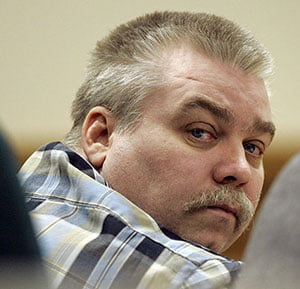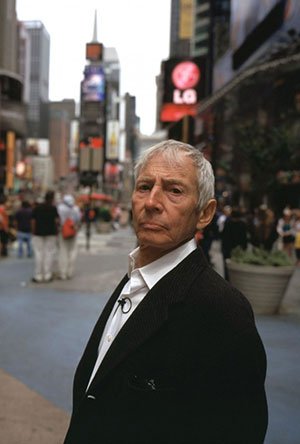Great ratings bring great responsibility
By Belisa Balaban
15-04-2016
As TV dramas get bigger and better, so too are the stories audiences seek in non-fiction, and what’s really exciting is that ‘bigger’ now often means more socially relevant.
When a network says it wants to take more ‘risks,’ it may mean that it wants films and TV shows that go after greater institutions of power. ‘Noisier’ can mean the show crosses into popular and political culture by inspiring audiences to bring what they watched into the real world through signing a petition, taking action or just adding to the public’s understanding of an issue or situation.
We know already that audiences have come to rely on factual entertainment for their news. Despite assertions that our content is intended as ‘personal filmmaking,’ ‘satire’ and even ‘fake news,’ we see repeatedly that audiences are relying on them to help make sense of the world and find their own point of view on current events.

Steven Avery, the subject of Making a Murderer
We saw this in late 2014 when viewers of John Oliver’s Last Week Tonight on HBO posted 45,000 comments in response to an episode on net neutrality – crashing the Federal Communications Commission website. More recently, more than 500,000 viewers of Netflix’s Making a Murderer signed petitions calling for the pardoning and release of its subject, Steven Avery. That’s a big real-world impact for non-fiction programming, and the kind of audience engagement we all crave.
At Pivot we watch these moments closely. It’s our explicit goal to create content that inspires and compels social change. Across our parent company Participant Media, every piece of content gives viewers actions they can take if they are inspired by what they’ve seen, whether it’s just to get more information or to go further and take an action like signing a petition or sending a letter to representatives. For us, it is exciting to see audiences so engaged in issues that they create their own social action campaigns in support of subjects they care about.
But while this is in many ways an exciting trend, it’s also a risky one. While some television programming follows journalistic standards, these are neither expected nor desired in all programmes across all platforms. Audiences crave a point of view that gives them a roadmap to navigate through the massive amount of information and all the stories available to them on a minute-by-minute basis.
Entertainment programmes are able to offer this more authored experience precisely because they do not need to adhere to the same set of rules as traditional journalism. Entertainment networks/platforms are also in a different category from news organisations, and as such the filmmakers and showrunners are held accountable differently from reporters.
Director Spike Jonze has said that Viceland, the new cablenet from Vice Media of which he is co-president, will be ‘far from objective.’ This highly personal, inherently biased way of seeing the world and presenting its programming is one of the key components of Vice’s success. The sharp point of view of The Daily Show (and the multiple new satirical current events shows it has spawned) is the reason we’ve been relying on it to curate and make accessible the day’s news for almost 20 years. And it’s been nearly five years since host Stephen Colbert’s fictional alter ego raised more than a million very-real dollars from Americans as they learned about political action committees.

The Jinx looks at the case of Robert Durst
Documentary features – the precursors to much of the non-fiction television of today – have a great history of impacting criminal cases. Groundbreaking films like The Thin Blue Line and the Paradise Lost series reversed legal verdicts. The most successful podcast in history, Serial, prompted a new court hearing. Accused murderer Robert Durst, the subject of HBO’s The Jinx, may be facing a new trial after evidence unearthed in the show came to light.
While documentary filmmakers often observe the strict rules of traditional journalism, just as often they assert that they are storytellers first and reserve the right to paint a more subjective picture. To a certain degree this is an essential truth, and an essential freedom, and filmmakers would have been unable to create many of the most important and impactful films of all time if they were constrained by the rules of news reporting. That said, there is still a weighty burden of responsibility on us as programme makers and broadcasters to ensure that the truth isn’t lost in the quest for splashy headlines or sky-high ratings.
When we start seeing real-world impact, we need to figure out what our standards are going to be. Our business affairs departments are not an adequate solution for a new ethics code that recognises this responsibility. Their function is vital to our companies’ business interests, but not sufficiently broad, nor defined by the increasingly imperative need to define a standard by which we decide what to air, and what to say about it. The standards of the reality television revolution that has taken place over the past 15 years is certainly not an adequate bar by which to vet many of the shows that our audiences are demanding, and that we want to make.
No show will please everyone – whether because of its style or its storytelling. But we have some big questions to ask. Have we been fair to our subjects? Have we made clear what this programme is? Ultimately, are we doing right by our audience? Maybe each network asks these questions individually, but more effective would be to ask these questions together as an industry. It’s a good problem to have: being relevant, being relied upon, making a difference. Both art and journalism make vital contributions to our public dialogue. But with the two rubbing shoulders evermore closely, it’s time for us to re-examine the way we present the work we make to an eager audience ready to act on what they’ve seen.















.jpg)




























